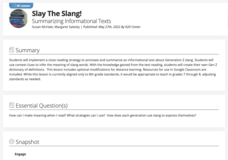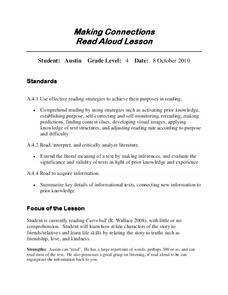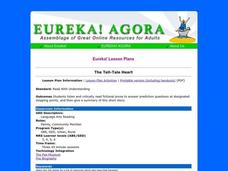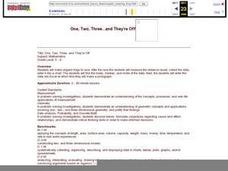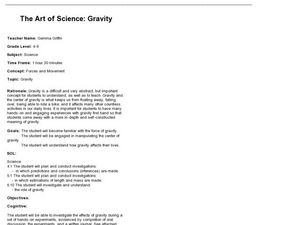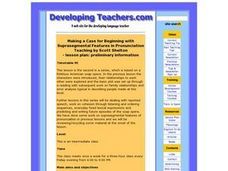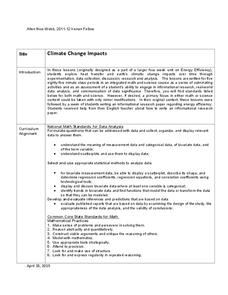It's About Time
Inferences of Waves
Building on the previous lesson, scholars use Slinkies to create standing waves. They graph waves on a calculator and then apply their knowledge to both sound and light waves. This is the fourth in a series of nine lessons.
K20 LEARN
Slay the Slang! Summarizing Informational Texts
Middle schoolers get hip to the jive with a lesson about slang. They closely examine examples of slang and use context clues to infer the meaning of the terms. Groups read and summarize an article about a teacher who created a Gen Z...
Curated OER
Unwind: Directed Reading Thinking Activity
To generate interest in reading Neal Shusterman's young adult science fiction novel Unwind, class members engage in a Directed Reading-Thinking Activity (DRTA) that asks them to examine the front and back covers, the blurbs, and "The...
Reed Novel Studies
The Railway Children: Novel Study
How can you prove your innocence? After being falsely accused and placed in prison, the father in The Railway Children is looking for the answer to the question. The children make friends with an elderly gentleman who helps them prove...
Curated OER
Making Connections
Fourth graders investigate visual imagery to aid reading comprehension. In this reading strategies lesson, 4th graders discover how visual imagery helps in comprehending a story. Students use a reader's notebook to record connections.
Reed Novel Studies
The True Blue Scouts of Sugar Man Swamp: Novel Study
Wild feral hogs and an alligator wrestler are just two interesting aspects of Kathi Appelt's novel The True Blue Scouts of Sugar Man Swamp. Using the novel study, scholars search the text for examples of the eight parts of speech....
Reed Novel Studies
The Library Card: Novel Study
Books open up the world. Four main characters in The Library Card discover the amazing things that happen at a library. Scholars complete sentences with 10 new vocabulary words, create similes and alliterations, and give a prediction for...
Curated OER
Clouds
Students explore clouds. In this weather lesson, students identify the steps in the water cycle, define condensation and evaporation, and relate this information to cloud formation. Students perform a cloud experiment, predict weather...
Curated OER
The Tell-Tale Heart
Readers listen and critically read fictional prose to answer prediction questions at designated stopping points, and then they give a summary of the short story. This lesson is ideal for English language learners developing English...
Curated OER
One, Two, Three...and They're Off
Students make origami frogs to race. After the race they measure the distance raced, collect the data, enter it into a chart. They then find the mean, median, and mode of the data. Next, students enter this data into Excel at which time...
Curated OER
The Art of Science: Gravity
Through a series of experiments and demonstrations, fifth graders will learn about gravity. They will make predictions, drop various objects, write down their observations, and try to understand gravity through balance. This lesson seems...
Curated OER
Night of the Twister
Students use reading strategies for Night of the Twister. In this reading strategies lesson, students name five major catastrophes and books about each. Students complete a vocabulary section, make inferences and predictions, read the...
Curated OER
Sentence Completion: High-Intermediate Level
Learners can practice their reading strategies and comprehension skills with a sentence completion worksheet that comes with a detailed answer key. Whether you use the worksheet as an assessment or as a group or individual practice...
Curated OER
Esperanza Rising-Inferences
Sixth graders make inferences while reading. In this inferences lesson, 6th graders read Esperanza Rising and ask questions about the text.
Curated OER
Fire!, Probability, and Chaos
Students explore the concept of probability. In this probability lesson, students simulate a controlled forest burn using an applet. Students vary the probability of trees burning and predict what will happen.
Curated OER
During Reading Strategies
Middle schoolers employ strategies to increase comprehension while they are reading. In this language arts lesson, students must infer, predict and visualize in order to improve comprehension.
Curated OER
Preliminary information
High schoolers develop reading strategies: inferring meaning from context. They work together in order to negotiate the meaning of the various vocabulary items. Students predict the personality of the main character in each of the books.
Curated OER
Reading About the Journey: The Odyssey
Young scholars practice their reading skills. In this reading fluency and comprehension lesson, students read instructor-selected passages from The Odyssey following the provided steps for the reading class activity that requires them to...
Hampton-Brown
From "First Crossing"
Young scholars look closely at four tales taken from the collection of short stories, First Crossing edited by Donald R. Galloby. While examining the life of four teenagers and the lives they lead as U.S. immigrants, your enthusiastic...
Curated OER
Developing Reading Comprehension
Developing reading comprehension is an ongoing process that begins the moment a child becomes engaged with literature. From learning the skills to navigate a picture book to reading an assigned chapter in a chemistry text, good readers...
Granite School District
7th Grade CCSS Math Vocabulary Word List
Address key vocabulary in the seventh grade Common Core Math Standards with this comprehensive list. A series of word cards is also provided that supports each term with images and examples, making this an excellent tool for teaching the...
Curated OER
Making a Case for Beginning Wigh Suprasegmental Features in Pronunciation
Students explore the ways in which voice quality and intonation can convey meaning.
Curated OER
Statistics and Probility
Seventh graders collect data and make predictions. In this geometry instructional activity, 7th graders work in tiers collecting data and plotting it. They make inferences and predictions about their collected data.
Kenan Fellows
Climate Change Impacts
Turn up the heat! Young mathematicians develop models to represent different climates and collect temperature data. They analyze the data with regression and residual applications. Using that information, they make conclusions about...



